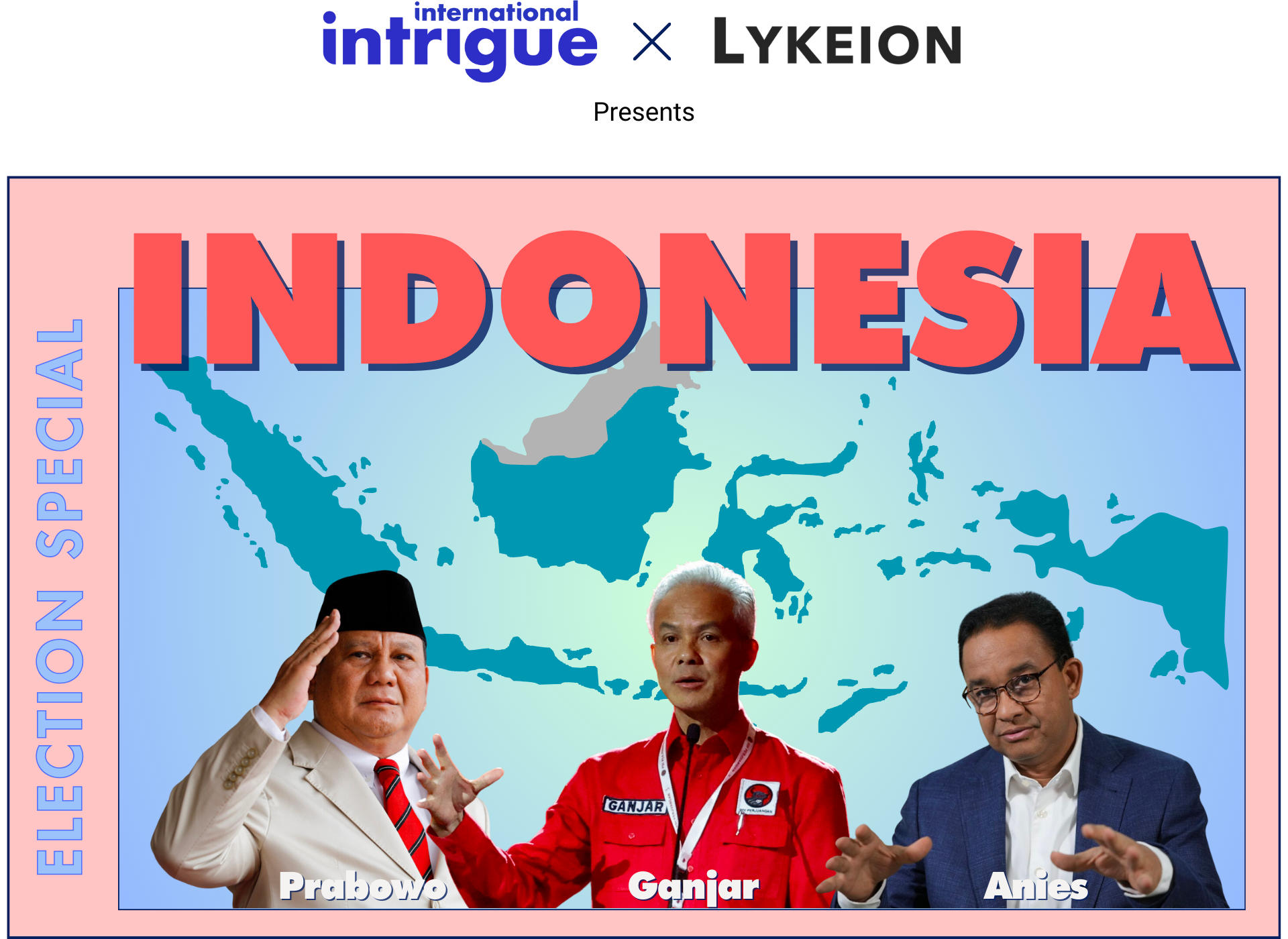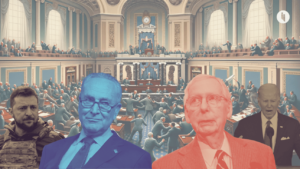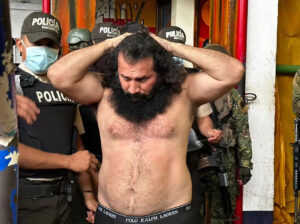In this briefing
- The tl;dr:
- Background
- Meet the candidates
- Why Indonesia matters
- What’s next?
The tl;dr:
- Indonesians will vote for a new president this Wednesday, 14 February. There are three candidates, but the latest polls suggest former general Prabowo Subianto will win. If no candidate secures over 50% of the vote, the top two will move to a run-off election in June.
- Prabowo is ahead thanks to the backing of the popular outgoing president and a campaign promising to keep the good times rolling. But Prabowo would bring a chequered past and authoritarian instincts to the top job.
- Indonesia has a lot going for it right now,includingyouthful demographics, geographic advantages, strong GDP growth, and a remarkable recent history of pulling people out of poverty.
- By virtue of Indonesia’s position at the crossroads between Asia and the world, its next president will be forced to deal with some of the world’s most complex problems, including the US-China rivalry, territorial disputes in the South China Sea, and the looming possibility of war over Taiwan.
Background
Is Indonesia the most underrated country in the world? Probably. We don’t know who needs to hear this, but Indonesia is so much more than Bali. It’s got:
- The world’s fourth-largest population
- The world’s largest Muslim population
- More than 700 languages across 17,000 islands
- One of the world’s fastest-growing economies, and
- The same flag as Monaco, for some reason

Clockwise from top left: Borobudur Temple in Java, Mount Rinjani in Lombok, Raja Ampat in Papua, the capital city Jakarta.
You’ll never need to ask a diplomat if they served in Indonesia: trust us, they’ll tell you. But otherwise, the country doesn’t get much attention in the West.
Stay on top of your world from inside your inbox.
Subscribe for free today and receive way much more insights.
Trusted by 114,000+ subscribers
No spam. No noise. Unsubscribe any time.
So, as the world’s third-largest democracy heads to the polls this week, we think it’s high time to share not only what makes Indonesia matter, but also what makes it so beguiling.
Meet the candidates
On the surface, Indonesia’s elections look like any other. But there are three intriguing differences.
First, the presidential election is now a three-way race (heading to a two-way runoff in June if nobody clears 50% this week). The new president and vice president will be sworn in on 20 October.
Second, while many of us will be used to thinking about elections as ‘left’ vs ‘right’, that framing isn’t always helpful in the West, and it’s almost useless when thinking about Indonesia.
And third, unlike in much of the world, this is an election to replace an extremely popular president known as ‘Jokowi’, who is term-limited.
During his ten years in the top job, Jokowi has combined his made-for-Hollywood backstory (from a furniture shop to the presidential palace) with a collaborative style and an ability to get stuff done. When he leaves office, he’ll hand over a fast-growing economy, gleaming new infrastructure, and plummeting poverty rates.
That’s why this race has really become about who’s the rightful heir to Jokowi’s formidable legacy. It’s about who can keep the good times rolling.
And while Jokowi has technically not endorsed any of the horses, his son is now sitting in one of the saddles as a candidate for vice president. So let’s start there:
1. The favourite

Prabowo has been a familiar face in Indonesia for decades as a commander of the country’s special forces, defence minister, son-in-law of Indonesia’s long-time dictator (Suharto), and a two-time presidential candidate. But he’s never quite managed to reach the top.
He’s long been dogged by allegations he was involved in atrocities, particularly those committed during Timor Leste’s struggle for independence from Indonesia.
Prabowo denies the accusations, but they’re credible enough for him to have been booted from the military, exiled to Jordan, and variously banned from visiting Australia and the US. He also (falsely) claimed past elections were stolen.
What’s changed? It’s incredible what PR consultants and a top-notch TikTok team can do, because Prabowo has successfully rehabilitated his image and cultivated more grandfatherly vibes, even earning himself the nickname ‘gemoy’ (adorable).
But really, the thing that’s cemented his position as frontrunner was his choice of Jokowi’s son Gibran Rakabuming Raka as his running mate. Gibran (36) was only allowed on the ticket after Indonesia’s Constitutional Court lowered the age restriction from 40 to 35.
In a final twist to the tale, the Chief Justice who handed down the decision last October just so happened to be Jokowi’s brother-in-law, so it’s no wonder many Indonesians say the president is hand-picking his own successor.
Top campaign promises – all about continuity:
- Development – Prabowo has promised to continue the president’s economic plans, including more investment in infrastructure.
- Flagship proposals – He’s pledged to establish a $25.5B free school lunch and milk program.
- Foreign policy – Like his country, he is often hard to pin down on world affairs. For example, last year, he proposed a peace plan for the Russo-Ukraine War that mostly favoured Russia, seemingly off the cuff.
2. The dark horse

To the extent anyone can close the gap, it’s probably Anies Baswedan, the former Governor of Jakarta. Bravely for someone trying to succeed one of the world’s most popular leaders, Anies has been critical of Jokowi (see below).
He’s a US-educated Fulbright Scholar and former education minister who’s doing particularly well with college-educated voters. He’s generated a little bit of momentum lately (admittedly from a low base), but his best chance is to hope Prabowo falls short of an outright win on Wednesday and then unify anti-Prabowo voters before the run-off election in June.
It’s a long shot, but not impossible.
Top campaign promises – let’s be smarter:
- Economy – A survey of economists voted Anies as best placed to manage Indonesia’s $1.5T economy, with his strategies to address inequality while investing in rural development and new green industries.
- Democracy – He’s highlighted a need to strengthen Indonesia’s democracy while pushing back against its feudalism and dynasties, though this doesn’t seem to be a top voter priority.
- Foreign policy – Anies has described the country’s diplomacy as “too transactional and passive”, and pledges to shift to a more values-based approach to the world.
- Infrastructure – He also backs infrastructure spending but is the only candidate criticising the president’s massive $35B project to erect a new capital city in the jungles of Borneo.
3. The fading star

At a glance, you might be forgiven for assuming Ganjar Pranowo was still the favourite. Ganjar is the former governor of Central Java, and he’s actually the candidate for the outgoing president’s ruling party.
Plus he’s built a significant public profile through his savvy use of social media to connect directly with constituents.
But following an internal power struggle, Jokowi declined to endorse his own party’s ticket,and his son emerged on the leading Prabowo ticket above.
This was the kiss of political death for Ganjar, but in truth, his popularity was already dwindling. His criticism of Israel last year (before the Israel-Hamas war) contributed to world football body FIFA stripping Indonesia of the right to host the 2023 Under-20 FIFA World Cup. Polls showed Ganjar’s popularity in the football-mad nation then dropped quickly.
Top campaign promises – between continuity and change:
- Economy – He’s promising 7% annual GDP growth by investing in industrialisation.
- Flagship proposals – He’s pledging to open one clinic for every village, provide free internet for students, and deliver better law enforcement.
- Foreign policy – He wants to maintain Indonesia’s “autonomous” and “free and active” role in the world by better leveraging its resources.
4. Candidate cheat sheet
| Candidate | Foreign policy | Domestic policies | Economy |
|---|---|---|---|
| Prabowo Subianto | Off the cuff and erratic | Continuity with Jokowi, but with more authoritarian instincts | Focus on economic development and job creation |
| Anies Baswedan | More values-based | Break from some of Jokowi’s policies | Focus on civil rights, inequality, and rural development |
| Ganjar Pranowo | Leverage natural and human resources for international influence | Continuity with Jokowi | Focus on economic growth and industrialisation |
Why Indonesia matters
Indonesia matters because of where it is, what it is, and what it has.
1. Geography
Indonesia is located smack bang on two important crossroads: the ‘east-west’ (between the Pacific and Indian Oceans) and the ‘north-south’ (between Asia and Australia).
This proximity gives it power in two ways.
First, it sits on (and co-controls) one of the world’s most important trade arteries: the Strait of Malacca. Together with the Straits of Sunda and Lombok, it’s the main way for energy, raw materials, and goods to get in and out of the South China Sea, the world’s busiest sea lane.

Second, it’s in a region that’s already ground zero for US-China rivalry, with each competitor offering two distinct visions for how the Indo-Pacific should look.
These two factors mean not just the US and China, but also India, Japan, Australia, the EU and others put a high priority on keeping Indonesia on side.
2. Geopolitics
Indonesia is big, but it’s also distracted.
How big? We’re talking 280 million people, which means the country will require more election workers on Wednesday than there are people in Denmark. It’s on track to become the world’s 6th largest economy by 2027.
And how distracted? With hundreds of distinct communities spread across 17,000 islands, Jakarta has long felt a nagging sense of insecurity as it deals with the ebb and flow of various insurgencies, secessionists, territorial disputes, and jihadis.
It’s all led successive generations of Indonesian leaders and elites to view the nation’s size less as an asset and more as a vulnerability to be managed.
This is partly why Indonesia’s approach to the world tends to be guided by an attempted neutrality – driven by a sense that its plate is already full at home. But that stance is becoming harder to maintain, making the next president’s choices critical.
Some key global questions awaiting the new president include:
- 🇺🇦 The Russo-Ukraine War. Indonesia has been hurt by the wheat and fertiliser shortages caused by the war. And as host of the 2022 G20 Summit, it was eager to show it could actively contribute on the world stage. For those reasons, Jokowi initially supported UN resolutions condemning the invasion, and tried to mediate between Moscow and Kyiv. But since then, he’s avoided joining sanctions against Russia, and has stuck to Indonesia’s more traditional approach of keeping out of the fray. Will the new president follow Jokowi’s lead?
- 🇨🇳 China is Indonesia’s top trading partner and second-largest source of investment. These ties have arguably blunted Indonesia’s response to China’s confrontational approach to disputes in the South China Sea. Indonesia prefers to handle things through the regional body (ASEAN), but ASEAN has been too divided and slow-moving to be effective. If the next president serves two full five-year terms like Jokowi has, this issue will almost certainly cause him headaches.
- 🇺🇸 The United States is Indonesia’s top security partner, helping wean it off older Russian military kit while partnering on hundredsof joint defence activities. But these deepening military ties don’t mean Indonesia will necessarily help counter China. To the contrary, it’s voiced unease at some US initiatives, and it triggered jitters when it allowed Russian nuclear bombers to carry out exercises in 2017.
- 🇹🇼 Taiwan. It’s unclear how Indonesia might react if a war over Taiwan breaks out. Would it allow US forces in Australia (and even Australian forces) to transit Indonesian waters and airspace to aid Taiwan? Or would it thwart US Navy attempts to close the Strait of Malacca (a presumed US move to squeeze a wartime China)?
We’re not exaggerating when we say that these types of decisions in Jakarta have the potential to shape history. And they’ll depend very much on who’s in the Merdeka Palace (Indonesia’s presidential residence).
3. Economic trajectory
Just reading about Indonesia’s economic story is enough to give you whiplash. It contracted by more than 60% after the Asian Financial Crisis (1997) before growing nearly 800% through to today. It really accelerated under Jokowi, averaging out ata 10% compound annual growth rate since 2000.
And the IMF is forecasting at least 5% annual growth over the next five years, which would make it the 6th largest economy in the world (by PPP).

Chart by Lykeion
What’s driving this relentless growth?
- Infrastructure projects. Jokowi has devoted 5-7% of GDP to infrastructure, compared to an average of just 1% across G20 countries.
- Commodities exports. Indonesia’s three biggest commodities are coal and petroleum products (24%), palm oil (12%), and nickel (12%).

Chart by Lykeion
Indonesia’s nickel story, in particular, tells us a lot about how the country has leveraged its natural resources.
Nickel is one of the world’s most in-demand metals, not only because it’s vital to the energy transition (think EVs and batteries) but also because it’s critical in more traditional industrial production.
In fact, more than two-thirds of all global nickel production is still used to produce steel, which is (along with a few other inputs like cement, plastics, and ammonia) critical for the development of advanced economies everywhere.
And Indonesia is by far the world’s largest nickel exporter (see chart below) despite being tied with Australiafor having the world’s largest nickel reserves. How’d it manage that?

Chart by Lykeion
Back in 2014, Jokowi made an important – if controversial – calculation: he banned raw nickel exports. (For what it’s worth, the EU successfully argued that the move violated WTO trade rules.)
Foreign investors didn’t like the move at first, but the nickel industry (particularly in China) quickly understood the implications: a ban on exporting the raw material meant that if China wanted Indonesia’s nickel, it’d have to invest in processing it in Indonesia.
The result?
Indonesia went from exporting $6B in raw nickel in 2013 to $30B in processed nickel in 2022 (including via things like stainless steel and battery inputs). 70% of that processed nickel now goes to China.
And this is just one of the ways Indonesia has used its natural endowments to drive growth, pulling millions of Indonesians out of poverty. Indonesia’s unemployment rate is now in line with most OECD countries (~5%), and the country’s poverty rate now stands at just 2.5%, down from a high of 70% in 1998.

This is a remarkable achievement. Chart by Lykeion
So what’s next?
There’s a lot of wind in Indonesia’s sails as it heads into this Wednesday’s election.
And we haven’t even touched on the country’s entrepreneurial spirit, youthful demographics, huge and growing consumer base, recovering tourism industry, or thriving startup sector.
A recent poll by Indikator Politik Indonesia projects Prabowo to win the election with 51.8% of the vote. Anies Baswedan is projected to win 24.1%, with Ganjar Pranowo taking 19.6%. If those results hold, Prabowo would become president without the need for a runoff election later this year.
But whoever wins the election will inherit some real challenges.
- It’s getting harder to sit on the geopolitical fence. As the stakes increase, the players (China, the US, Russia, the EU, etc) will push Indonesia harder, using more leverage across trade, tech, and investment.
- Indonesia’s economy is too concentrated, not only in its drivers (exports) but also its specific exports (coal, palm oil and nickel), customers (China), and broader structure (a handful of tycoon families control vast segments of the economy). This kind of concentration leaves Indonesia more exposed to economic shocks.
- Another looming challenge is debt. All that infrastructure spending has fuelled borrowing, with huge repayments now falling due and some major builders already eyeing off bailouts, making their banks nervous.
You’d be forgiven for arguing that President Jokowi has done the easy bit: using a commodities and infrastructure strategy to pull Indonesia from low to middle-income status.
Historically, the tougher challenge for fast-developing countries has been to make the next transition to a more diversified and sustainable economic model. The Indonesians aren’t alone here: the Saudis and Emiratis have been focused on this for a decade.
And that brings us back to Indonesia’s three-horse race this week, with its dominant theme: continuity.
With the possible exception of the dark horse candidate (Anies), it’s been a race to continue Jokowi’s approach rather than prepare folks for what realistically must come after it.
That’s something the winner will need to ponder once he finally gets the keys to the Merdeka Palace.
International Intrigue and Lykeion jointly produced this briefing. Our thanks to Tim Purcell, Diego Tremiterra and Scott Smitson. Check out Lykeion’s excellent website here.









